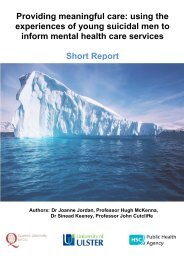Saving Mothers' Lives: - Public Health Agency for Northern Ireland
Saving Mothers' Lives: - Public Health Agency for Northern Ireland
Saving Mothers' Lives: - Public Health Agency for Northern Ireland
Create successful ePaper yourself
Turn your PDF publications into a flip-book with our unique Google optimized e-Paper software.
166<br />
12 Deaths from psychiatric causes<br />
Drug and alcohol abuse<br />
The provision of drug and alcohol services varies across the country with some integrated services while in<br />
other areas there are separate drug services and alcohol teams. Given that poly-substance misuse i.e. alcohol<br />
and sedatives often in combination with opiates and alcohol has become the norm, it would be appropriate <strong>for</strong><br />
this vulnerable group of women to have their drug and alcohol addiction treated in the same setting.<br />
Need <strong>for</strong> integrated specialist care<br />
Although there are examples of truly outstanding integrated care, in assessing these cases it is far more<br />
usual to fi nd a lack of integration between community midwifery and specialist midwives and hospitalbased<br />
obstetric care. Additionally, it is also evident that the continuing lack of integration between addiction<br />
services and maternity services also results in little or no in<strong>for</strong>mation being passed between the two<br />
services. It is recommended that integration be achieved in each maternity service ideally by joint service<br />
provision between addiction services and maternity services <strong>for</strong> these vulnerable women but, where that is<br />
not possible, by joint discussion of care plans between services to improve the in<strong>for</strong>mation held by each.<br />
A number of women who died were managed by their GP and midwife without the involvement of drug<br />
treatment services and an obstetrician. The women’s methadone was prescribed by their GP and often there<br />
was little awareness of the extent of their continuing use of street drugs. Women with substance misuse<br />
problems in pregnancy should not be managed by GPs and midwives alone. They should be fast-tracked<br />
to integrated care nested within maternity services, the so-called “one stop shop”. This should comprise<br />
both specialist midwife and obstetrician, drug treatment professionals, social workers and other relevant<br />
professionals and resources so that multidisciplinary and multi-agency care can be provided on one site.<br />
Identifying substance misuse<br />
There remains an issue of under-identifi cation of women with problematic substance abuse within<br />
maternity services. At the fi rst visit maternity staff providing antenatal care <strong>for</strong> pregnant women should<br />
routinely ask <strong>for</strong> any history or present consumption of prescribed and non-prescribed, legal and illegal<br />
substances including tobacco and alcohol. Staff may require training in taking an addiction history as well<br />
as providing in<strong>for</strong>mation on local specialist drug and alcohol services and ongoing support in managing this<br />
group of women.<br />
All current guidelines recognise the need <strong>for</strong> an accurate assessment of drug and alcohol use, the need <strong>for</strong><br />
associated social problems to be addressed and emphasise the importance of an integrated multi-agency<br />
approach. It is recommended that local protocols should be in place <strong>for</strong> effective collaboration between<br />
agencies and services, these should prescribe the arrangements <strong>for</strong> assessment and ongoing care with<br />
the ideal being that an integrated service should be available to these women.<br />
Communication<br />
In only a very few deaths does there appear to be any integration, communication or correspondence<br />
between addiction services and maternity services. Additionally, GPs are providing little or no in<strong>for</strong>mation<br />
to obstetricians and midwives of a woman’s past drug or alcohol history, with the history there<strong>for</strong>e not being<br />
revealed until late in the pregnancy. This further strengthens the recommendation made throughout this<br />
Report, that GPs actively in<strong>for</strong>m obstetricians and midwives of any knowledge of a woman’s past history of<br />
drug or alcohol misuse or addiction as early as possible in any pregnancy.<br />
Co-existing mental health problems



